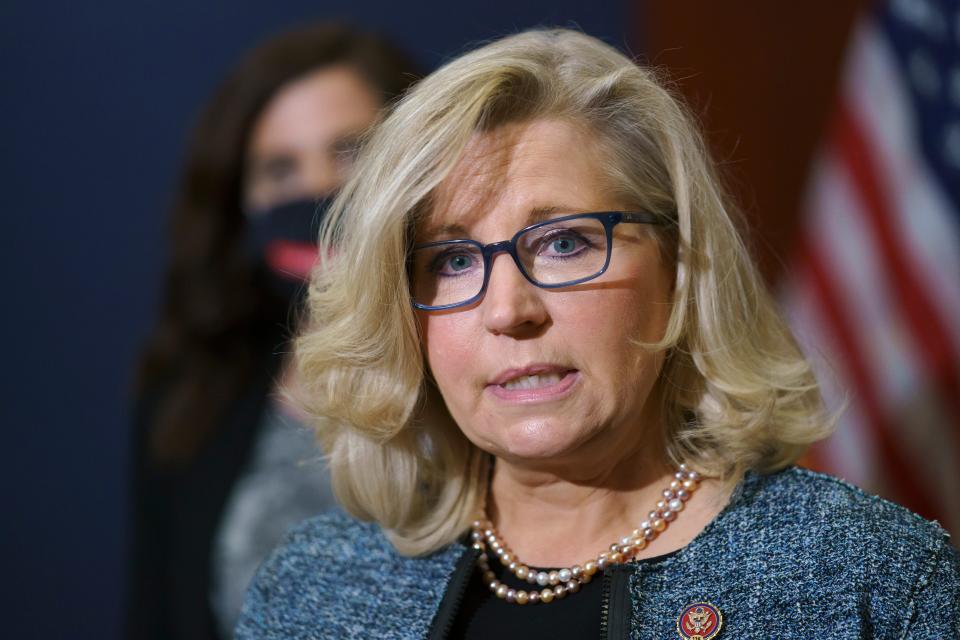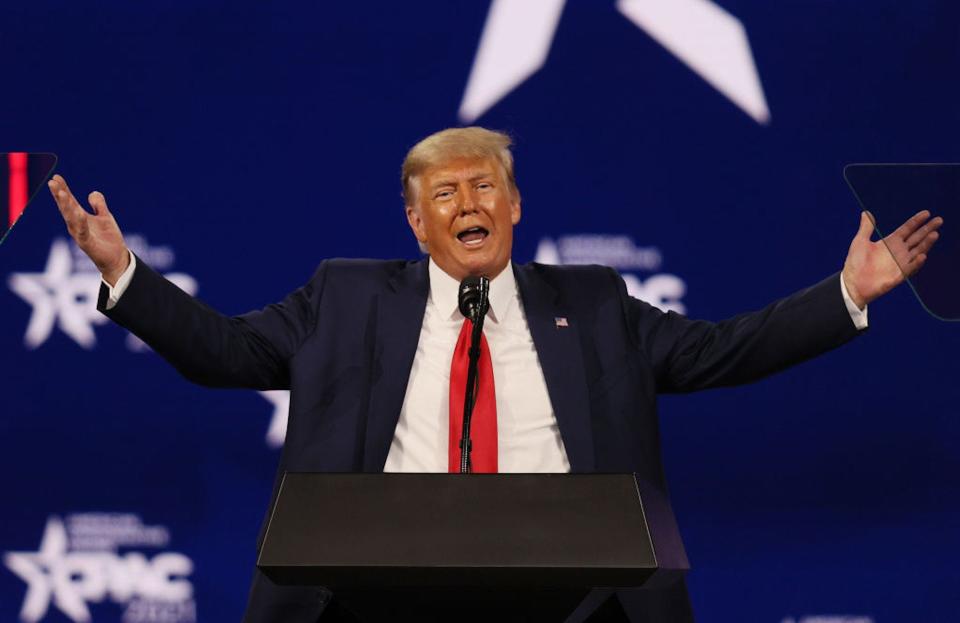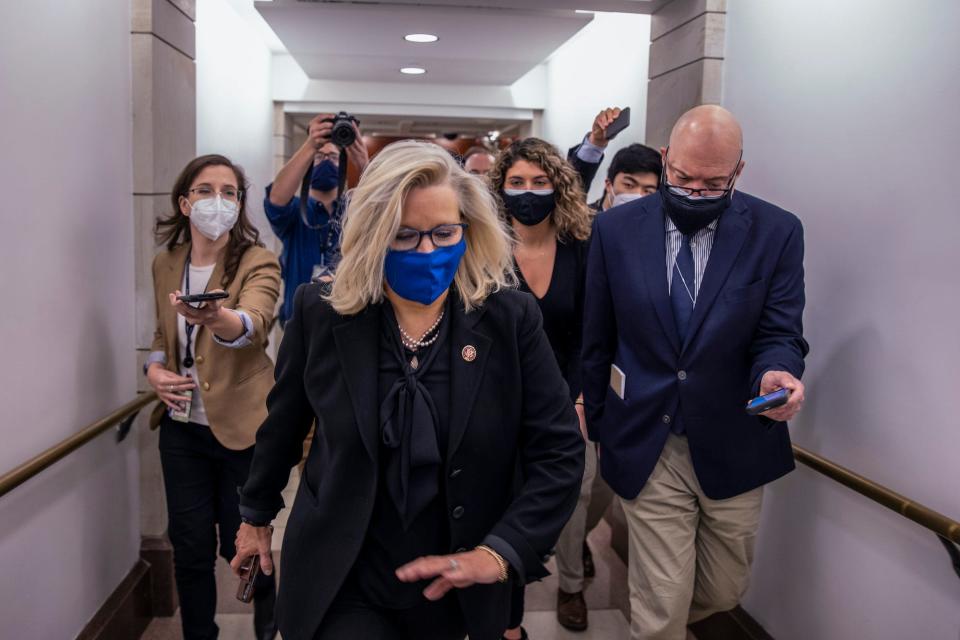Liz Cheney ousted from GOP leadership: A timeline of her metamorphosis from rising star to political outcast
- Oops!Something went wrong.Please try again later.
- Oops!Something went wrong.Please try again later.
After weeks of speculation, Liz Cheney was ousted as the Republican House Conference Chair.
Cheney refused to back down from her criticism of Trump for his role in the Capitol riot.
Over the past few months, she has emphasized her commitment to the rule of law - no matter who occupies the White House.
GOP Rep. Liz Cheney, who was first elected to represent Wyoming's at-large congressional district in 2016, has long compiled a voting record that reflects her conservative political beliefs.
In 2017, she voted for former President Donald Trump's signature Tax Cuts and Jobs Act, which cut the corporate tax rate from 35% to 21%.
She supported a repeal of the Affordable Care Act, known as Obamacare, calling the Democratic-enacted health care legislation "a disaster for hard-working Americans."
The congresswoman has been a proponent of a muscular foreign policy, aligned with the Republican Party viewpoint of increasing military and defense spending to reaffirm American dominance throughout the world.
Cheney, the daughter of former Vice President Dick Cheney, boasts a 80 percent lifetime rating from the Heritage Action for America, the conservative policy organization.
For the current congressional session, she has an even higher 98 percent score.
She voted with Trump's position on legislative issues 92.9 percent of the time during his four years in office.
And yet, Cheney was just ousted as the House Republican Conference Chair, the third-highest ranking position within the GOP caucus, due to her continued public admonishment of Trump for his role in the deadly January 6 Capitol riot.
Cheney wanted to move on from Trump, but the House GOP rejected her instead.
Last November, then-GOP Rep. Greg Walden of Oregon spoke glowingly of Cheney in a Politico interview.
"You could see a speaker's gavel in her hand, and I don't think it's that many years off frankly," he said. "She kind of reminds you of Margaret Thatcher or somebody like that in history: a strong person, in a big position, a woman who stands her ground in an otherwise male-dominated conference."
Less than a year later, Cheney finds herself on the outs with top conservatives in the party, fueled by a determined effort from Trump to find a GOP challenger to defeat her in next year's primary election.
Here is how Cheney's descent from House leadership was put into motion:
January 6: Cheney immediately rebukes Trump after the Capitol riot
Cheney saw the Capitol insurrection as an affront to the rule of law - it disrupted the Electoral College certification of President Joe Biden's 2020 electoral victory and sent lawmakers into secure spaces away from the mayhem that was unfolding at the ornate building.
To Cheney, Trump abdicated his commitment to the secure and peaceful transfer of power, threatening democracy based on debunked election theories that were used to whip up aggrieved supporters who felt that he had been wronged.

That same day, Cheney laid out a blistering indictment of Trump.
"We just had a violent mob assault the US Capitol in an attempt to prevent those from carrying out our Constitutional duty," she said in a statement. "There is no question that the President formed the mob, the President incited the mob, the President addressed the mob. He lit the flame."
She added: "This is what America is not. It has just been absolutely intolerable and unacceptable. The mob will not prevail."
January 13: Cheney votes to impeach Trump
Cheney was one of 10 House Republicans who voted to impeach Trump for "incitement of insurrection" for his role in the riot that occured just a week earlier.
In announcing her vote to convict, the congresswoman was scathing in her rebuke of Trump.
"None of this would have happened without the President," she said. "The President could have immediately and forcefully intervened to stop the violence. He did not. There has never been a greater betrayal by a President of the United States of his office and his oath to the Constitution."
Voting for impeachment against a president in the same political party is already a rarity, but Cheney's political pedigree and stature immediately put her vote under an intense microscope.
February 3: A vote is held on Cheney's future in leadership
By going against Trump, the reigning leader of the GOP, Cheney's position in leadership was quickly imperiled, especially among conservatives who remained steadfastly loyal to the former president.
Despite the dissent among many members at the time, she had the support of House Minority Leader Kevin McCarthy of California, a critical boost.
During a February 3 vote on Cheney's fate in leadership, she gave an intensely personal speech, saying that she was "deeply concerned about where our party is headed," according to The New York Times Magazine.
In a 145-61 vote, the Republican caucus decided to keep Cheney in leadership.
February 6: Cheney is censured by the Wyoming GOP
The reverberations from the GOP turmoil in Washington, DC, quickly created trouble for Cheney back home in the Equality State.
On February 6, Cheney was censured by the state party for her vote to impeach Trump.
Wyoming Republicans contended that Cheney's position was a slap in the face to will of the state's voters, who gave 70 percent of vote to Trump in the 2020 presidential election.

"Does the voice of the people matter and if it does, does it only matter at the ballot box?" said Joey Correnti, the GOP chairman in Carbon County, according to the Associated Press.
After the censure vote, Cheney defended her position, saying that she would continue to focus on representing the state.
"Foremost among these is the defense of our Constitution and the freedoms it guarantees," she said. "My vote to impeach was compelled by the oath I swore to the Constitution."
February 28: Trump goes after Cheney at CPAC
During his keynote speech at the Conservative Political Action Conference (CPAC) in Florida, Trump derided Cheney as a "warmonger," with the mention of her name resulting in a chorus of boos.
"The good news is in her state, she's been censured and in her state her poll numbers have dropped faster than any human being I've ever seen," he said at the time. "So hopefully they'll get rid of her with the next election."
Trump's focus on Cheney and other Republicans who sought to impeach him has been a lingering sentiment that the former president is unable - and unwilling - to shake off.
April 27: The cracks in leadership become apparent
For weeks, the relationship between Cheney, McCarthy, and House Minority Whip Steve Scalise has deteriorated as Cheney continued to lambast Trump for his false claims about the election.
In late April, McCarthy publicly declined to say whether he believed that she should remain in the party's leadership.
When asked by Punchbowl News reporter Jake Sherman whether Cheney was still "a good fit" for the leadership team, McCarthy ducked on offering his personal assessment.
"That's a question for the conference," he said.
In a Politico interview from the day before, McCarthy chided Cheney for speaking straying from GOP messaging at the party attempts to regain control of the House in the 2022 midterm elections.
"There's a responsibility, if you're gonna be in leadership, leaders eat last," he said. "And when leaders try to go out, and not work as one team, it creates difficulties."
May 9: McCarthy officially backs a successor to Cheney
On May 9, McCarthy threw his support behind Rep. Elise Stefanik of New York to ascend to the No. 3 leadership position.

Stefanik has a much more moderate voting record than Cheney, but has continued to question the legitimacy of the 2020 presidential election, much to the delight of Trump, who also endorsed her taking Cheney's position.
May 10: A leadership vote is called
McCarthy announced in a letter to the GOP caucus that a May 12 vote would be scheduled on whether to recall Cheney from leadership.
He said that after hearing from "so many" of his members about Cheney being "distracted" by her criticism of Trump, a vote was necessary.
"Each day spent relitigating the past is one day less we have to seize the future," he said, adding that "these internal conflicts need to be resolved so as not to detract from the efforts of our collective team."
May 12: Cheney is ousted from leadership
Cheney, a longtime champion of conservative values, was removed as the House Conference Chair in a voice vote by a caucus still largely committed to Trump and his false election claims.
While Cheney's long-term political future is uncertain, she reiterated her sentiments about the presidential election in a defiant House floor speech on May 11.
"Remaining silent and ignoring the lie emboldens the liar," she said. "I will not participate in that. I will not sit back and watch in silence while others lead our party down a path that abandons the rule of law and joins the former president's crusade to undermine our democracy."
Read the original article on Business Insider

